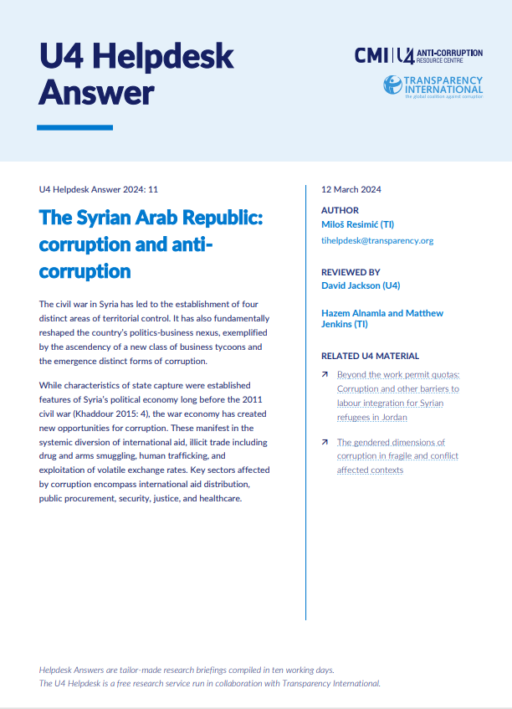
This Anti-Corruption Helpdesk brief was produced in response to a query from a U4 Partner Agency. The U4 Helpdesk is operated by Transparency International in collaboration with the U4 Anti-Corruption Resource Centre based at the Chr. Michelsen Institute.
Query
Please provide an overview of corruption in the Syrian Arab Republic.
Summary
The civil war in Syria has led to the establishment of four distinct areas of territorial control. It has also fundamentally reshaped the country’s politics-business nexus, exemplified by the ascendency of a new class of business tycoons and the emergence distinct forms of corruption.
While characteristics of state capture were established features of Syria’s political economy long before the 2011 civil war (Khaddour 2015: 4), the war economy has created new opportunities for corruption. These manifest in the systemic diversion of international aid, illicit trade including drug and arms smuggling, human trafficking, and exploitation of volatile exchange rates. Key sectors affected by corruption encompass international aid distribution, public procurement, security, justice, and healthcare.
Main points
- While the civil war has weakened the Syrian state, in government controlled areas the state apparatus has not disappeared altogether but rather transformed. This transformation, and the persistence of certain state functions, has facilitated various forms of predatory corruption, including administrative corruption and state complicity in organised crime.
- As constraints on corruption have evaporated in the chaos of war, both state and non-state actors have capitalised on new schemes for illicit profit. The new opportunities for corruption that have arisen in areas controlled both by the Assad government and opposition groups as a result of the war economy include extortion, protection rackets, the exploitation of volatile exchange rates and the trafficking of drugs, arms and human beings.
- By disrupting pre-war political-business relations, the conflict has also led to the emergence of a new class of business tycoons who have enriched themselves by exploiting the war economy.
- The main sectors affected by corruption include international aid, public procurement, security, justice and health. In particular, corruption results in the systemic diversion of international assistance funds to benefit local power brokers and de facto authorities.
Contents
- Background
- Civil war
- Areas of control
- Extent of corruption
- Forms of corruption
- Drivers of corruption
- Main sectors affected by corruption
- Other stakeholders
- References
Authors
Miloš Resimić, [email protected]
Reviewers
Hazem Alnamla and Matthew Jenkins (TI)
David Jackson (U4)
Date
27/03/2024
Tags
 Download PDF
Download PDF
